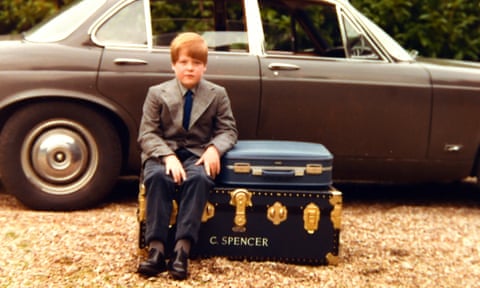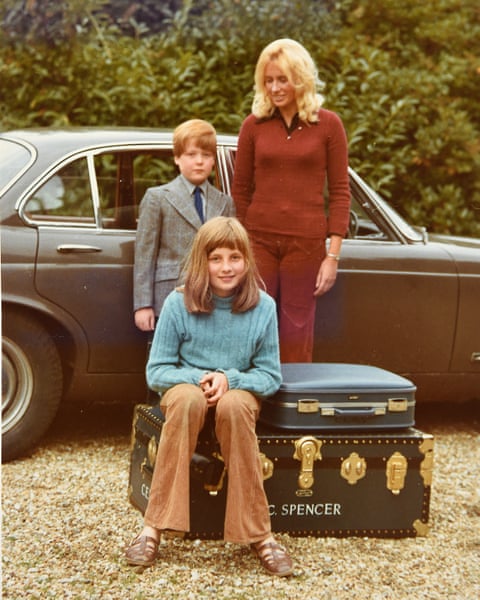Join Date: Feb 2011
Posts: 50,563
Thanks: 28,767
Thanked 14,428 Times in 10,234 Posts
|
 Re: ROYALS: Princess Dianas' Brother Earl Spencer Talks About His Sexual Abuse at Sch
Re: ROYALS: Princess Dianas' Brother Earl Spencer Talks About His Sexual Abuse at Sch
Earl Spencer on The Pain of Boarding-School Abuse - ‘I don’t think I developed emotionally’
The brother of Diana, Princess of Wales, talks about his difficult decision to write about being physically and sexually abused and the resistance he faced from members of his own class
The Guardian 18 MAR 2024
 Charles Spencer as a boy before going to Maidwell Hall as a boarding pupil.
Charles Spencer as a boy before going to Maidwell Hall as a boarding pupil.

Spencer with his sister Diana and nanny Mary Clarke in 1972.
It was one thing writing about the abuses of his childhood, Charles Spencer tells me, with half an ironic laugh; it’s quite another talking about them with strangers. When we meet in an office at his publisher, he is reeling a bit from this new fact of his life.
The more sensational chapters of his memoir of a deeply traumatic five years at the Northamptonshire prep school Maidwell Hall had been splashed all over the previous week’s Mail on Sunday.
The following morning, he had been a guest on Lorraine Kelly’s mid-morning TV sofa, raking over the painful detail of that long-buried past for the viewers. As a result, he says, apologising if he seems a bit strung out, he’s had two days of thumping headaches followed by vivid nightmares.
The early responses to his book about being sent away from home to be brutalised at school at eight years old have been instructive. On the one hand he’s had a mailbox of emails from fellow survivors, praising his courage in speaking up for the generations of “privileged” schoolboys and girls who, like him, suffered serial beatings and sexual assault in the closed world of boarding schools well before puberty.
On the other he’s experienced the default prurience of the tabloid press, which picked over his book for clickbait (ever since Spencer stood up in the pulpit at Westminster Abbey and blamed redtop journalists for hounding his sister, Diana, to death, he seems to have been considered fair game). The Sun, for example, thought the most appropriate headline for a book about the lasting harm of childhood trauma to be “Di Bro’s sex at 12 with hooker”.
The food writer William Sitwell, a near contemporary of Spencer’s at Maidwell and Eton, meanwhile, blithely dismissed the substance of the memoir in two columns in the Telegraph. In the first, Sitwell branded Spencer a traitor to his class:
“One of their own – an earl, uncle to princes, seriously landed, stately housed, replete with a deer park, fine furniture and fabulous paintings – is dishing the dirt from within…” he wrote. In the second, he argued, bizarrely, that “Spencer has not suggested that, beyond corporal punishment, he or anyone else was a victim of abuse”.
His book was written precisely to challenge that stubborn, unhinged belief among his peers that school regimes featuring daily beatings and endemic paedophilia “never did me any harm”. (Reading Sitwell’s piece I was reminded of an observation by Alex Renton, the journalist who has done much in recent years to shed light on the history of abuse at many of Britain’s most exclusive private schools.
Soon after Renton revealed the worst of what had happened to him as a child, he ran into an old school friend at a party: “Don’t stand near Alex,” the friend warned others present, “he’ll put his hand down your trousers.”)
The affecting power of Spencer’s account lies in its description of the way predatory violence was entirely normalised in his school years. Maidwell Hall was presented to wealthy parents as a kind of term-time paradise for young boys; once the family had departed down the gravel drive, Spencer writes, it became a hellish place.
The awful wound of homesickness was preyed upon by fearful teachers who bullied and thumped and caned vulnerable boys, or insisted on “special” naked swimming lessons; that was exacerbated by a senior matron obsessed with humiliating bedwetters, and a junior matron who molested 10-year-olds and had sex with 12-year-olds after lights out.
“I realised very early on that this was a horribly ugly subject,” Spencer says. “And I made a conscious effort to make the book as smooth a read as possible. As a result every now and then the reader might tread on a landmine and think: what the hell was that?”
 The identities of his fellow pupils are protected in the book (the historian in him has given each of them the name of one of King Charles I’s regicides). He names the teachers he knows to have died, including Jack Porch, the headteacher who “retired early” at 51 for 'unspecified reasons'.
The identities of his fellow pupils are protected in the book (the historian in him has given each of them the name of one of King Charles I’s regicides). He names the teachers he knows to have died, including Jack Porch, the headteacher who “retired early” at 51 for 'unspecified reasons'.
|